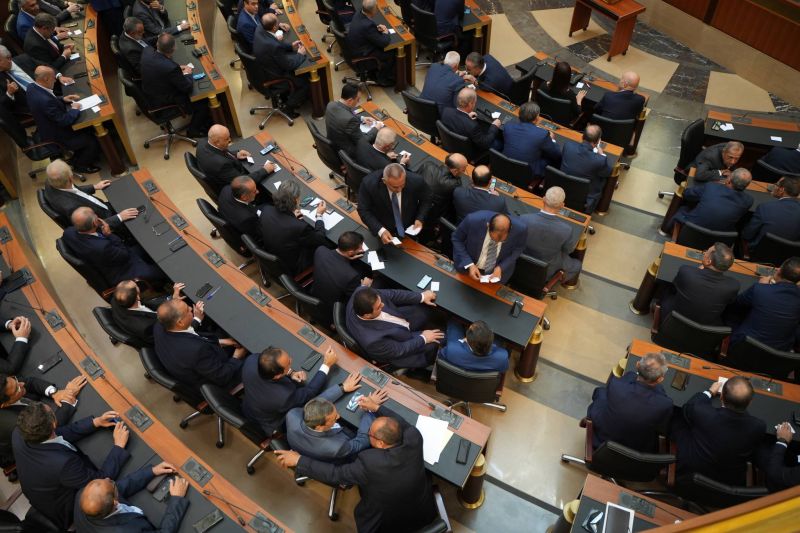
A parliamentary election session on Oct. 24. (Mohammad Yassin/L'Orient Today)
Want to get the Morning Brief by email? Click here to sign up.
Parliament is scheduled to meet today for an eighth attempt to elect a president, marking the start of the second month of Lebanon’s double executive vacuum. Previous parliamentary presidential election sessions consistently resulted in a protest vote majority — led by blank votes from Hezbollah, the Free Patriotic Movement and allied MPs, along with canceled ballots, votes for unlikely candidates and political slogans — against frontrunner Zgharta MP Michel Moawad, backed by the Lebanese Forces and their allies. None of the previous sessions maintained quorum past an initial voting round, seen by some as a deliberate move to avoid moving to subsequent rounds during which a president can be elected with fewer votes. Ahead of this week’s vote, caretaker Prime Minister Najib Mikati reiterated his support for Marada Movement leader Sleiman Frangieh, who is also seen to have Hezbollah’s support despite a disavowal from allied FPM head Gebran Bassil. Meanwhile, United Nations Special Coordinator for Lebanon Joanna Wronecka yesterday relayed the UN Security Council’s emphasis on the “urgency” of electing a president. US Congress members made a similar statement Monday at the start of their tour of Lebanon.
Lebanon’s legislators are scheduled to convene next Wednesday to address the “billions of dollars'' allegedly wasted in the telecoms sector. The sector faces accusations of a lack of transparency, irregular awarding of lucrative contracts, and illegal hiring of officials. Parliament will decide whether to transfer the charges to the High Court with jurisdiction over former presidents and ministers.The former telecoms ministers include Nicolas Sahnaoui, Boutros Harb, and Jamal Jarrah, according to current Caretaker Telecoms Minister Johnny Corm. MPs are also expected to decide on the formation of a parliamentary committee to investigate the purchase of state mobile operator Touch’s headquarters — a proposal dating from late summer 2019 accusing then-Telecoms Minister Mouhammad Choucair of corruption. A court audit of the Telecoms Ministry’s spending between 2010 and 2020 claimed $6 billion in overspending, totaling $17 billion, spent on Lebanon's mobile and fixed-line operators, namely Ogero, Alfa and Touch
A depositor threatened to set fire to a Chouf bank and immolate its manager in an attempt to forcibly recover part of his own funds. Walid Hajjar, accompanied by four of his in-laws, doused a Chehim branch of Credit Libanais in gasoline to reclaim $50,000 from his deposit reportedly needed to cover his wife’s cancer treatment. Hajjar allegedly already “sold the lands he owned, his car and his wife's jewelry in order to pay for the hospital bills,” his son told local media. Informal capital control measures implemented by private banks since 2019 severely limited depositors’ access to their foreign currency funds. Over the past months, a surge of holdups by depositors attempting to forcibly withdraw from their accounts pushed banks to heighten their security measures. Employing a different strategy to recover frozen funds, Gorges Gabriel Bitar — a Syrian national living in London — won a lawsuit heard in the British High Court of Justice. The foreign judiciary gave Banque Libano-Française (BLF) a five-day deadline to transfer Bitar’s funds before incurring penalty interest payments. The same depositor won a similar suit against Bank of Beirut, as have other depositors filing complaints with overseas courts to retrieve their funds.
Syrian authorities expressed their willingness to release a Lebanese shipwreck survivor in their custody since September’s failed irregular migration attempt that killed more than 100 people. Syrian authorities detained a number of survivors rescued from the wreckage of an irregular migrant boat that capsized off the Tartus coast in northern Syria after departing from Lebanon. Only 20 of the 150 people aboard the boat were rescued. Syrian authorities also reportedly arrested a number of survivors for dodging the country’s mandatory military service. The reason for the Lebanese national’s arrest remains unclear. Uncertainty also remains regarding the fate of several attempted migrants, leaving their relatives unable to fully mourn or grieve. The number of illegal departures from Lebanese shores more than doubled for the second year in 2022 with Syrian refugees comprising the majority of irregular migrants, driven by increasingly dire living conditions, United Nations refugee agency (UNHCR) official told L’Orient Today.
In case you missed it, here's our must-read story from yesterday: “From portraits of trees to a digital fountain”
Compiled by Abbas Mahfouz